I mean, I generally don't like these and I am not sure I have ever done one. But I feel like doing one for 2016 because the general consensus seems to be that it was a shit year and we're thankful it's over. And on a societal level, that's true.
However, there's something I really can't deny - in fact, on a personal level, I had a pretty good 2016. I did! My shit year was Dec 2014-Dec 2015, for reasons you know if you know me.
So, this isn't to gloat, it's to point out that a bad year on a sociocultural level doesn't necessarily equate to a bad year in total. I am sure good and bad things happened to us all despite the fact that the world is in a political shambles and we're probably all going to die.
A look back:
1.) Taiwan elected its first female president and, for the first time in its history, is not controlled by the (awful) KMT (not that I particularly love the DPP) - I know this isn't personal but it's worth mentioning. A few of these are not personal, but I think good enough to include
2.) My cousin spent several months in Taiwan
3.) I published my first ever journal article
4.) I passed the final module for, and received the full diploma for, the Cambridge Delta
5.) I was accepted into grad school
6.) I visited the US twice
7.) American women had the chance to vote for the first ever female presidential candidate (no, she was not a perfect candidate, and yeah, that turned out kinda bad, but I refuse to give up on that milestone in political history)
8.) I accomplished what I feel is my greatest achievement to date
9.) The Taiwanese legislature got the wheels rolling on marriage equality
10.) Hong Kong elected a slate of pro-democracy, pro-localization candidates (that, again, didn't turn out well thanks to Stupid China, but it still meant something)
11.) I made a fair number of interesting new friends
12.) I went to the Grand Pasta'ai
13.) I went to Vietnam for the first time (post forthcoming) and Indonesia for the second
14.) I traveled a fair bit around Taiwan, visiting Tainan three times, Kaohsiung, Yunlin, Xinpu (again, post forthcoming), and probably more that I can't recall exactly as I try to leave Taipei frequently to keep in touch with the rest of the country
15.) My closest and oldest friend in Taiwan got married
16.) I went to Hong Kong for the first time in five years (again, post forthcoming)
17.) Taiwan actually made the international news (kind of a mixed blessing though)
18.) I was invited to observe a session of the Legislative Yuan - watch my video here!
I would call that a pretty good 2016, wouldn't you? At least, it offers a chance to see the good parts, or find a few gems among the burnt rubble of the political and social sphere. Don't get me wrong, things were bad. The whole world with the possible exception of Taiwan is trending towards reactionary politics and fascism. The climate is, well, getting worse and it will probably be a massive problem very soon. A horrific mass murder and total destruction of a once-great city took place very close to my ancestral home, and the West did nothing. We elected quite literally the worst person in the world to be the leader of the "free world", a thing (I don't mean the event, I mean the "person") I can never accept as my president. As a result, I no longer consider myself American in anything but name and have no loyalty whatsoever to the USA. There is no forgiveness for this.
So yeah, things are bad globally. But personally, I have a few gems.
Showing posts with label pastaai. Show all posts
Showing posts with label pastaai. Show all posts
Saturday, December 24, 2016
Monday, November 14, 2016
Unity
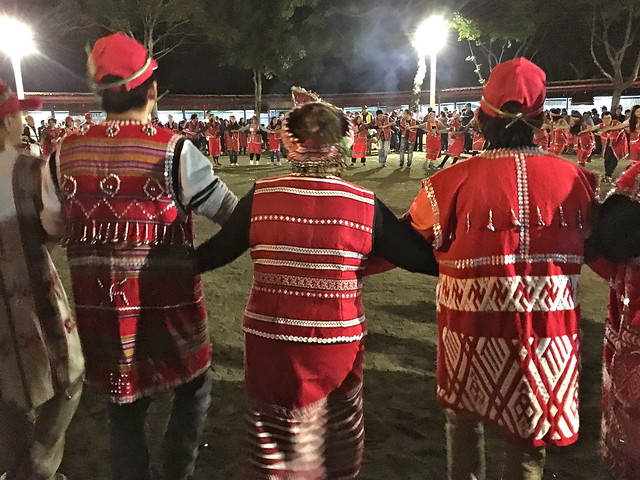
This year, I attended the Grand Pas'ta'ai festival in Wufeng (Hsinchu County) - my first Grand Pas'ta'ai but my third one in total. There is not much more I can say about it that hasn't been covered in these two previous posts from 2008 and 2010, but I do want to quickly note my observations of what made this one the "Grand" one.
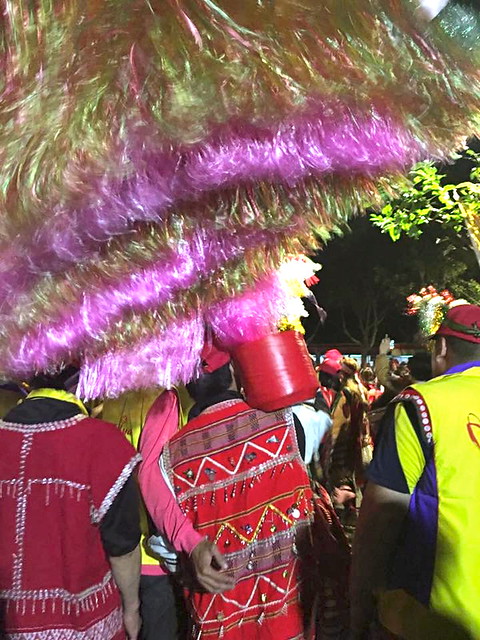
First, the Grand Pas'ta'ai is the only one where they bring out this long pole with red and white flags - I am sure one of my more knowledgeable friends knows what it's called. I was told by a bystander that it is extremely tall so as to reach to the heavens, to ask for blessings. Every few hours a group of people form an open circle around it and run around the regular dancing circle chanting rhythmically.
Secondly, there were more instances of running together into a circular group around one of the ceremonial placards - again I am sure one of my more knowledgeable friends knows why and can provide answers in the comments. I am not an expert. There were also more of these placards - which are shaped like open funnels to, I was told, entice the ta'ai (the 'mythical dark skinned wizard people' that the Saisiyat apparently massacred in ancient times, and now pay homage to by inviting them to this celebration around harvest time biennially) to join the celebration and give their blessings.
Finally, it's simply larger. In previous years we could always find a place to sit, and the dancing circle was fairly small, even when the public was invited to join. This year, the bleachers were packed, and the circle huge - at many points concentric circles were necessary. More or less every Saisiyat in the area attended, I was told, and many more people than usual were dressed in traditional garments.
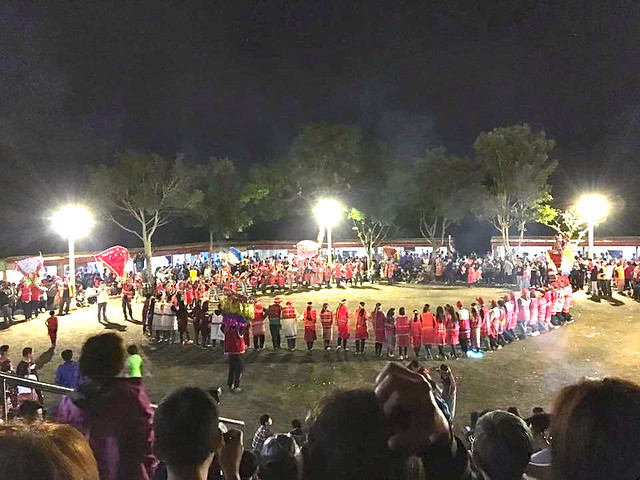
Now, I'd like to talk a bit about what made the event different for me this year. We stayed until dawn this year, and I will say that doing so does give one a different perspective on what this festival is like (the entire thing is held over three days, and for a real experience, try going for all three).
I did not get drunk this year - we were in charge of a rental car that folks who came with us drove out of Taipei, but we drove in the mountains. Although we theoretically had a ride to our homestay without having to drive (I figured I'd be drunk), deep down I knew I'd end up driving that car in the morning and intentionally paced myself. So did Brendan, but I also know that I am more able to cope with having stayed up all night and be present, coherent and in a state to drive after having done so (I just handle lack of sleep better than he does).
It also seems pertinent to point to a link between my experiences at Pas'ta'ai and recent happenings both in my somewhat-former social circle and the world.
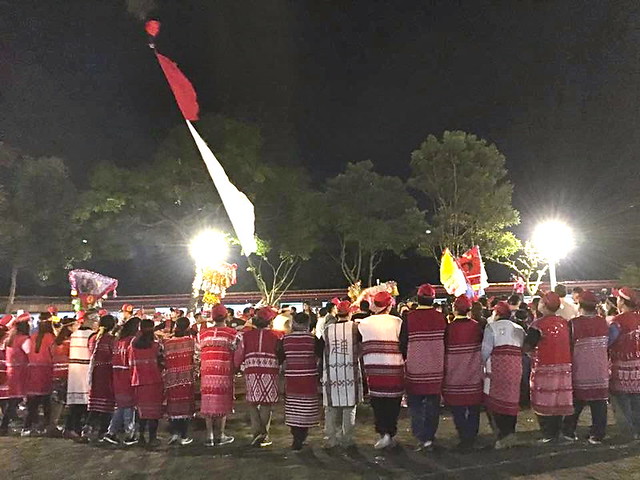
Around 3am, I took a walk around the back end of the ceremony site, where there is a covered walking area and several covered rooms where people can sleep, rest or put there things (it is pertinent to note that you do not have to fear for the safety of your personal belongings left unattended, as this plays into the next point). I came across two drunk teenage boys, both named Watan. In fact, I suspect one of them forgot his name and just called himself by his friend's name. They both started kinda-sorta hitting on me, one shouting "I AM SAISIYAT PEOPLE, I LOVE YOOUUUUU" before falling backwards off the ledge he was perched on (he was fine). The other kept half-coherently flirting while touching my shoulders and arms in a way I am not comfortable with any teenage boy doing - or really anyone I haven't implicitly invited to do so doing - let alone any drunk teenage boy. They were harmless and I wasn't scared or even bothered. But, I was trying to politely disengage.
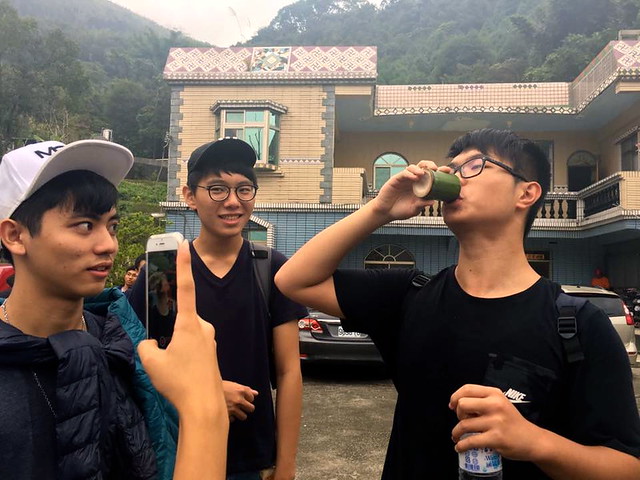
While this was happening, an older man was off to the side watching, and keeping a careful eye on the situation. He eyed me with the clear signal saying "Do you want me to intervene?" and I eyed him back with "I'm fine, thanks" and smiled at him as I finally, successfully, did disengage and go about my walk. It was clear that he was ready to step in.
This is not a story of drunk aborigines - frankly, that's about as stupid a narrative as talking about how drunk Westerners like to open a bottle of brandy on Christmas, so what? - which is a harmful stereotype. I see no issue with drinking scads of your local tipple on a big holiday. This is a story of what it takes to create a safe community and event. Saisiyat and Northeast American culture are as different as two cultures can be, and yet both me and this dude understood, on a universal level, how to respond to situations that could escalate into harassment or assault or even just making women feel uncomfortable. We both knew the universal Look of a bystander and a person in a situation.
There is no "cultural difference" where sexual harassment is concerned - to be clear, I do not think the drunk kids were sexually harassing me, and I really was not angered, offended or traumatized. In fact, it was kind of funny, because I knew I wasn't in any danger. But I see how it could have become that, and how someone watching it happen might have thought so. And there is no cultural difference when it comes to the collective responsibility of a community to keep their spaces and events safe and welcoming for all people.
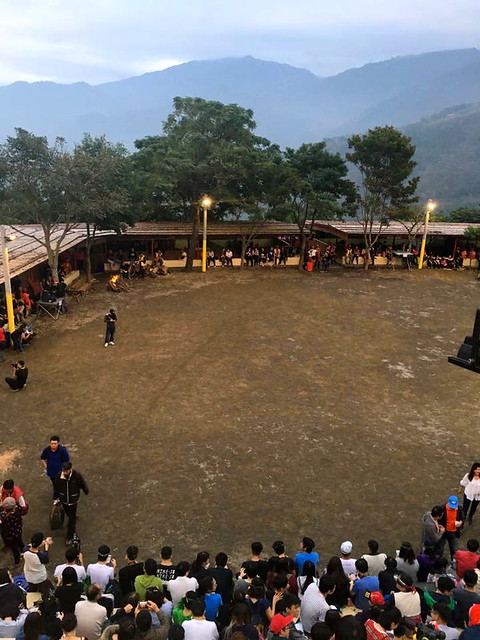
Let me reiterate, in case the point is not clear: a man at an all night dance party where approximately 100% of attendees are drunk (and this is expected, accepted and even encouraged), from a completely different culture, with whom I barely share a common language (because my Chinese isn't fluent - I am sure his is fine - and I do not speak Saisiyat), understood that collective responsibility. He got it. There was no "well public spaces aren't safe, women have to protect themselves (oh but everyone is welcome and happy)", none of this "you should be more careful", "it's not my job to create a safe event for women", "maybe you should protect yourself by learning self-defense or carrying mace", "I can't kick the harasser out of a public event" nonsense.
None.
Women at Pas'ta'ai are safe, because the community collectively ensures that they are.
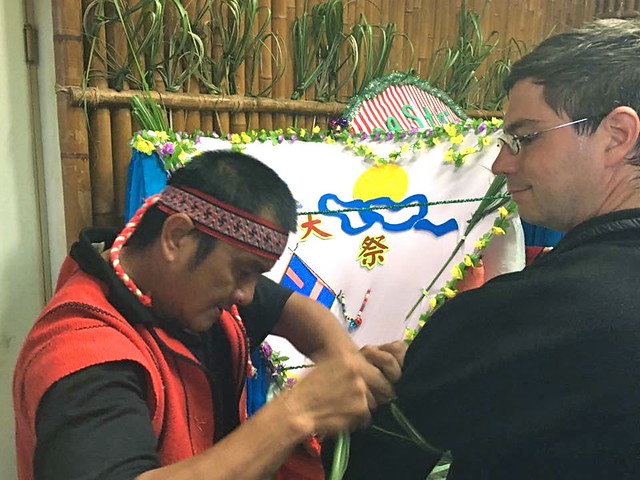
It really shows why I have no patience or sympathy for lily-livered "progressive nice guy but actually not an ally" claptrap, let alone right-wing or alt-right misogyny. It is not normal. This guy, at this event, is normal. With one look he made sure I knew he had my back. He didn't even have to intervene, and yet it was quite clear that women can expect safety. This is how it should be.
If you don't think you too have this responsibility, remind me not to attend your events.
This, too, bleeds into the absolutely devastating - to many of us who value progressive society - Trump win.
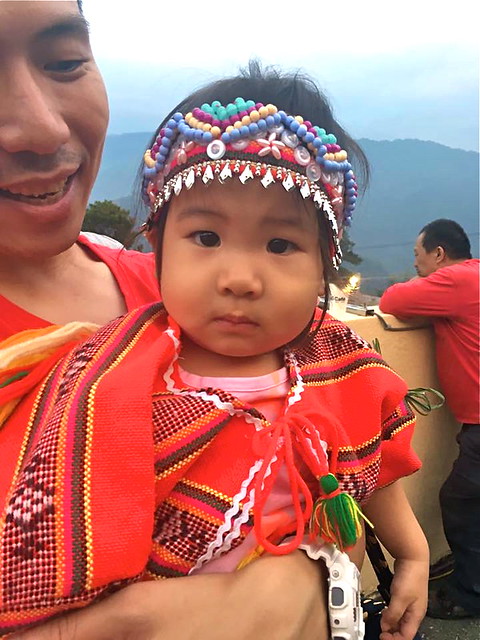
I've said it all on Facebook, but here we go. If you are calling for "unity" or asking us on the progressive left to "listen" and "empathize", I am not interested. There are many reasons - for example, the idea that Trump supporters voted that way because they are economically desperate is false, and even if it were true, it doesn't matter because voting for Trump was never going to bring back jobs that have irreversibly disappeared, or that Clinton is somehow "dishonest" (not really more so than any other politician and far more honest than Trump).
But they don't matter either - because there is no reason or excuse - not even one - that I can or ever will be able to accept for why one voted Trump.
Not. Even. One. Zero.
If you voted for someone with hate speech like that, on some level, you decided hate speech was okay. You decided it was acceptable enough to allow into the White House even if you do not personally say it. I do not care how much you hated Clinton, or how hard it is for you. I am not interested in your excuses for why hate speech was acceptable. Your reasons do not matter to me.
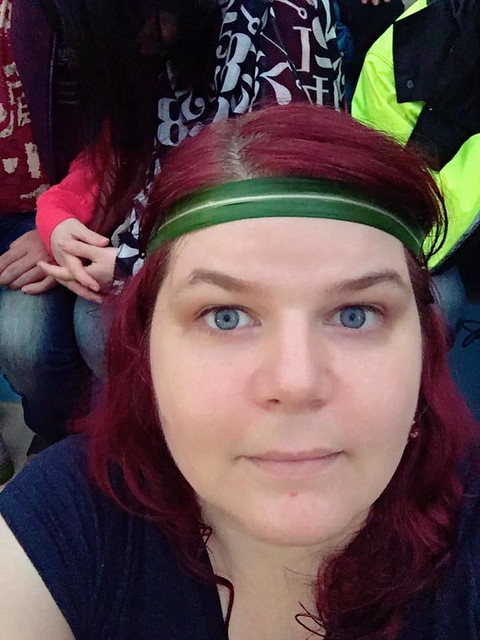
You decided it was acceptable to elect someone spewing hate speech, which is inherently a bigoted act. It is not enough to be personally okay or not bigoted in your daily life. You have to actively stand against it, or at least not vote for it, in order to qualify as a good person.
I am not interested in unity in this way - and calls for it do not sway me. If conflict is what is needed to defeat Trumpism, then although I don't like it, it may simply be what has to happen. I am surprisingly okay with disunity when the other side voted for hate speech.
But I do feel unity, just not with the US. At the end of the ceremony, as the night slowly turned to dawn, most people still at Pas'ta'ai came together in a circle and moved more or less together as we held hands and the tribe members sang (whether they were folk songs, just typical popular songs, traditional songs or hymns or other sacred music, I do not know). There was some pulling and discomfort, and not everyone was moving perfectly in sync. Occasionally our hands tore apart, but they always came back together. I was extremely tired and just sort of let the music sway me as I watched other people's feet, looking for the rhythm so I could do my part to keep the circle moving in time until the sun peeked out over the mountains beyond the ceremony grounds. Not just with Saisiyat participants but Taiwanese visitors of many backgrounds as well as other foreigners. All were welcome, and we collectively came together to ensure that all were safe. We probably disagree on some things, and maybe have differing values, but I could be sure we all more or less agreed on what the end goal was even if we had differing ideas on how to get there, and in that sense, we could work together.
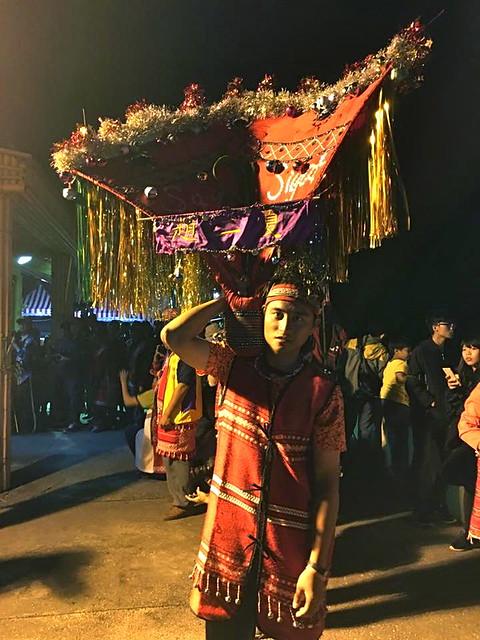
I thought back to the man who waited to see if he needed to intervene, and I thought about how my belongings were safe. I thought about how the majority of Taiwanese are interested in putting aside their past differences - Hoklo, waishengren, Hakka, aborigine or of non-Taiwanese roots - and moving forward. Perhaps not everyone, but enough to create the feeling of desire for change in society - change for the better, for all Taiwanese. I thought in my fuzzy sleep-deprived head about how, while Taiwan is not perfect, at least it is looking in the right direction. How Taiwan would never vote for someone like Trump - how open racism (including Islamophobia) and misogyny - even bragging about sexual assault - would be automatically disqualifying. I thought about how, even though I do not care for the various KMT candidates nor all of the DPP ones, that after the elections are over we can all more or less agree that voting for either candidate doesn't make you a bad person, and relationships resume as normal. In the past this also happened in the US - I may not have liked Bush, but he was more or less normal and acceptable within American democracy. In Taiwan, every candidate is at least nominally qualified and always educated enough to take on the role he or she is campaigning for.
I thought about how Taiwan elected a female president without much fuss at all and the majority of Taiwanese were annoyed, not turned, by attempts at making her singlehood and sexual orientation (which is unknown, but who cares?) into a scandal.
I thought about how Taiwanese fought for and won transitional justice, and when they do finally get marriage equality (one hopes within the next year), chances of people committing hate crimes against LGBT+ people are slim to none. Nobody's going to refuse to issue licenses, either. Such a stark difference from my own country.
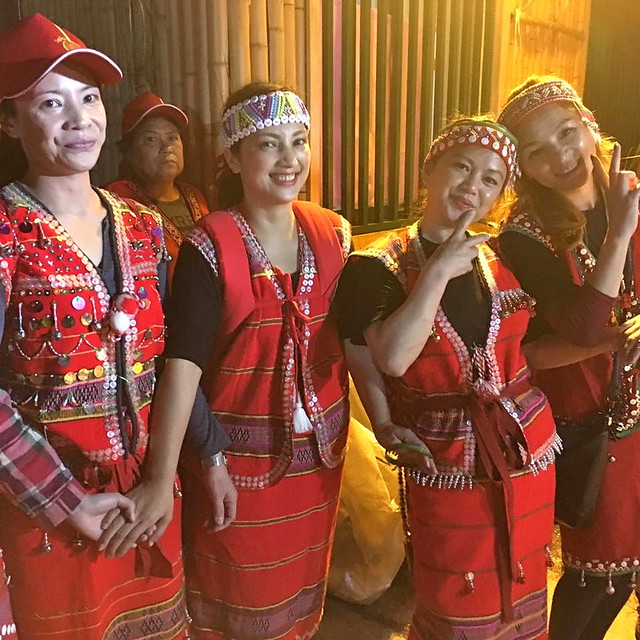
And as we danced together, arms linked, and I grabbed the hands of people to either side of me regardless of who they were and we all tried to dance together, that I am interested in unity.
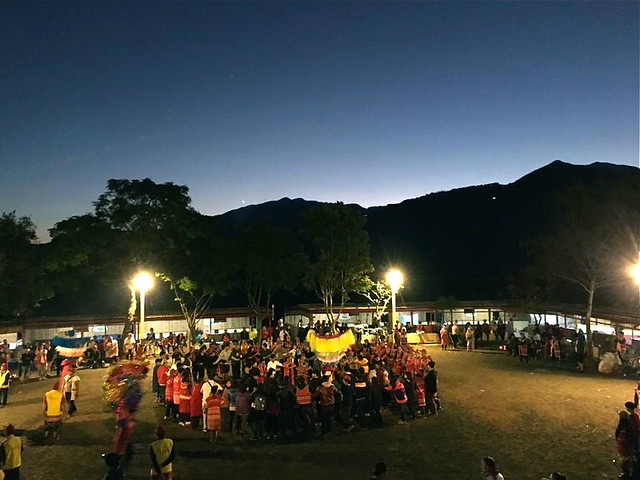
Unity based not on ethnicity or culture - I'll never be Saisiyat or "ethnically Chinese" in any way, though I would someday like to be Taiwanese - or even on totally shared values, as we all have to deal with people who think somewhat differently from us. But unity based on being fundamentally decent versus indecent - which is really the problem in the US. It's not liberal or conservative (I can find some points of agreement with conservatives on personal freedoms, for example) or "this person won and that person lost but they are both fundamentally decent people", which is how every previous election has been. This is different. This is indecent, this is a rhinoceros. I am not interested in unity where aggressive action is called for. I am when everyone involved is more or less working toward the same goal, though we have different ideas about to get there, and looking to the future with a progressive and tolerant eye, where people have "something" in them that knows right from wrong, where hate speech is not welcome.
I do realize that totalitarianism can hit any culture, and there are negatives about Taiwan (here's one example) that I could discuss, but fundamentally I think the culture is in a good place, and decency still reigns here.
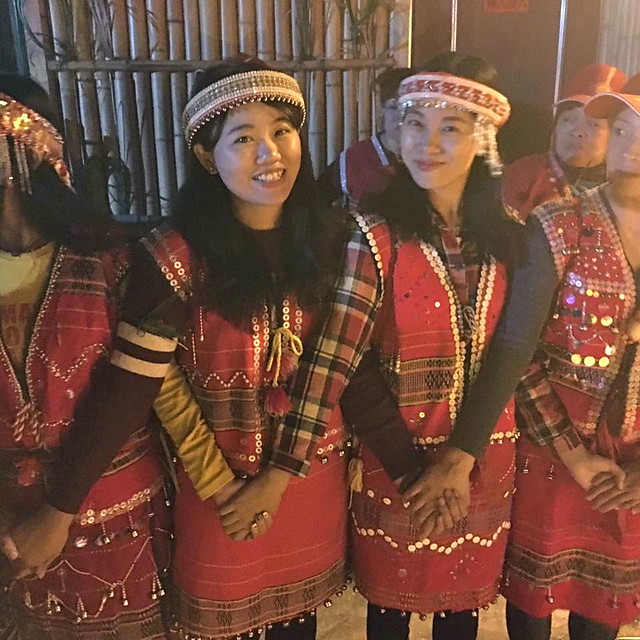
I cannot say this is true of my country right now, where I genuinely feel that the only thing separating Trump and Hitler is that Trump is too stupid to have a master plan, but I see no difference between Trump voters and Nazi voters (who, remember, were not all Nazis themselves - some just looked the other way).
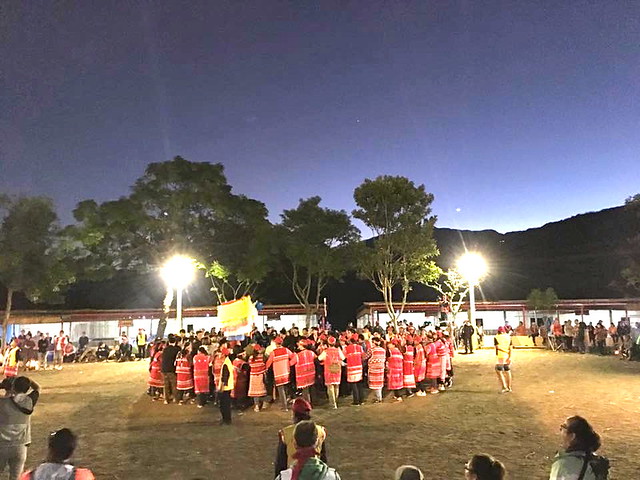
I'm interested in Taiwanese unity - not unification, mind you, but unity. And while I must hold an American passport for the time being, I can no longer consider myself truly American in any real sense.
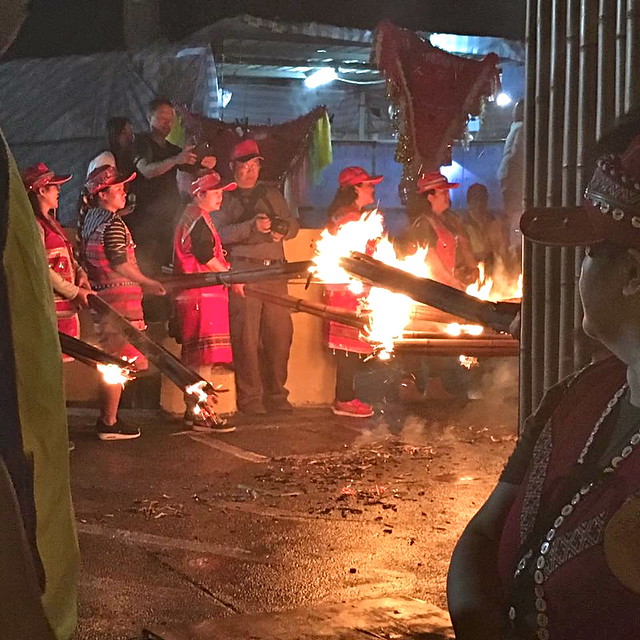
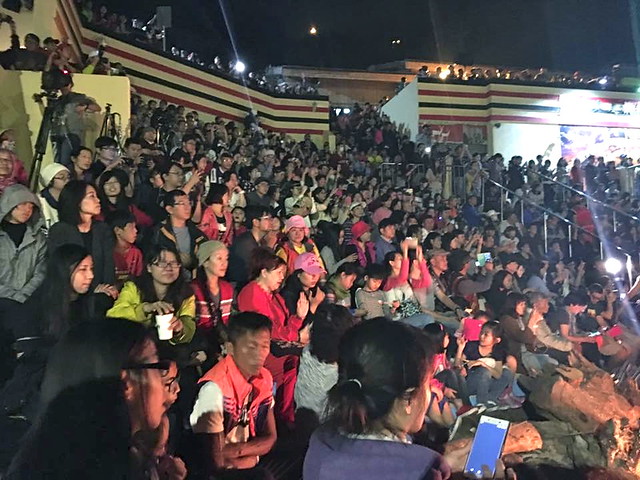
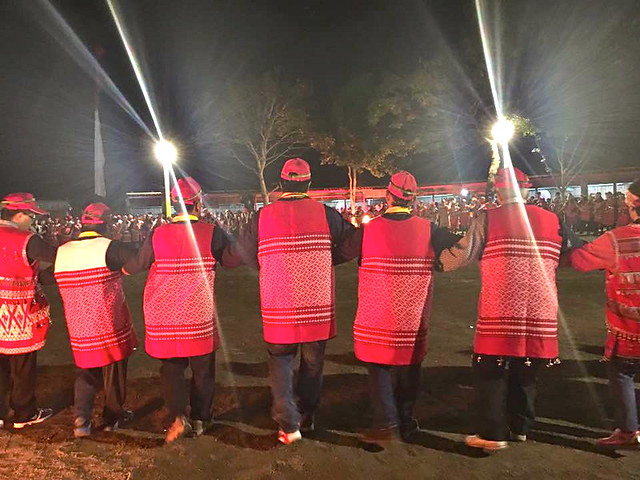
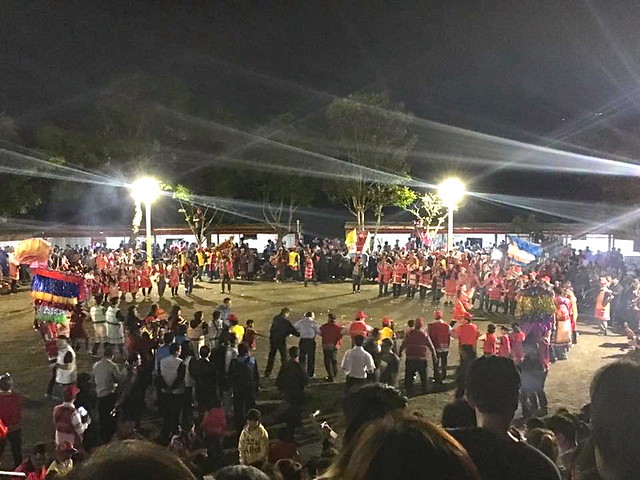
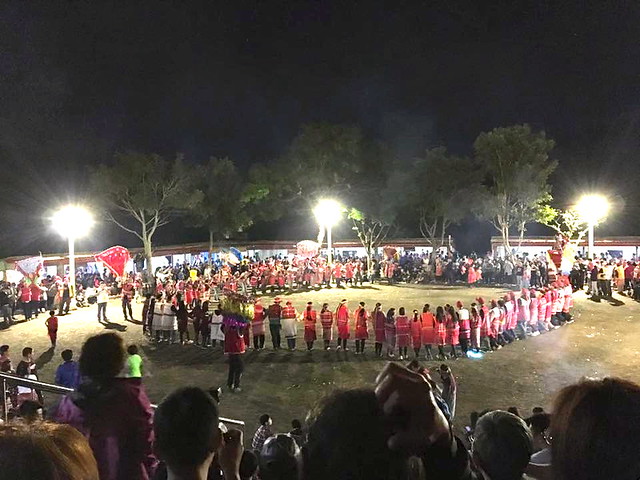
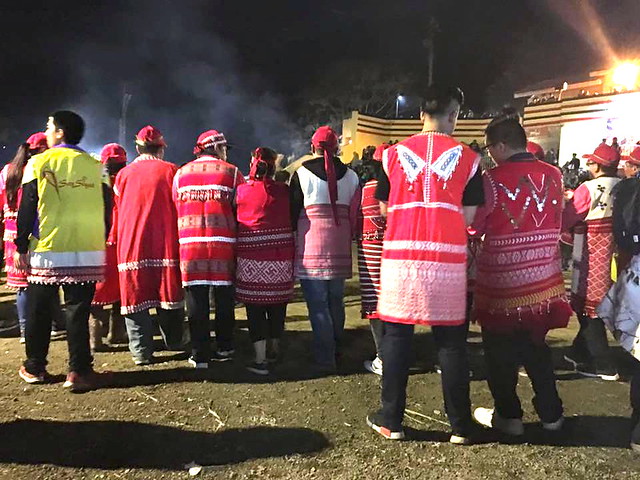
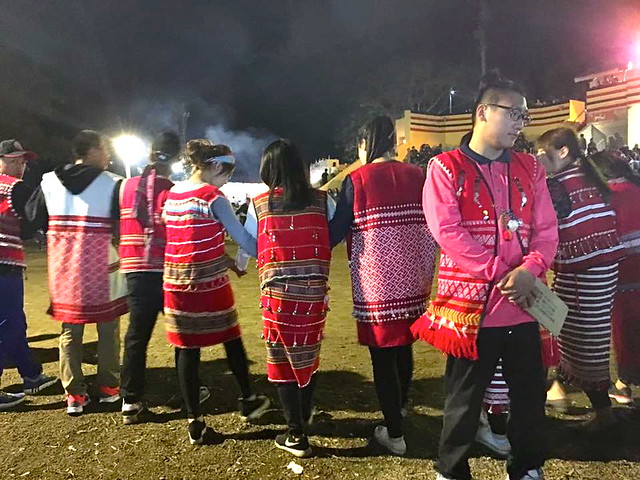
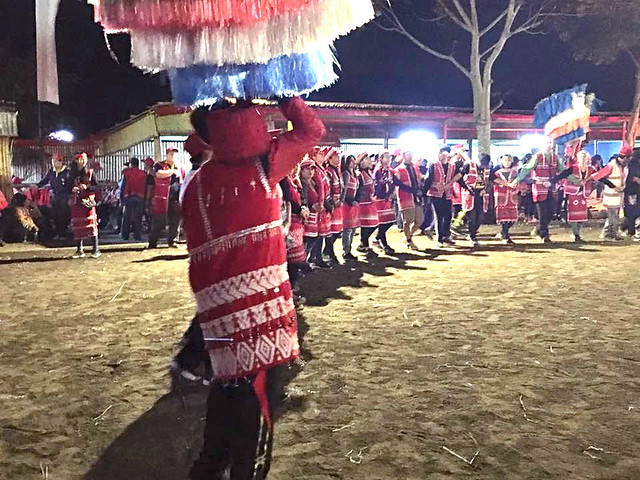
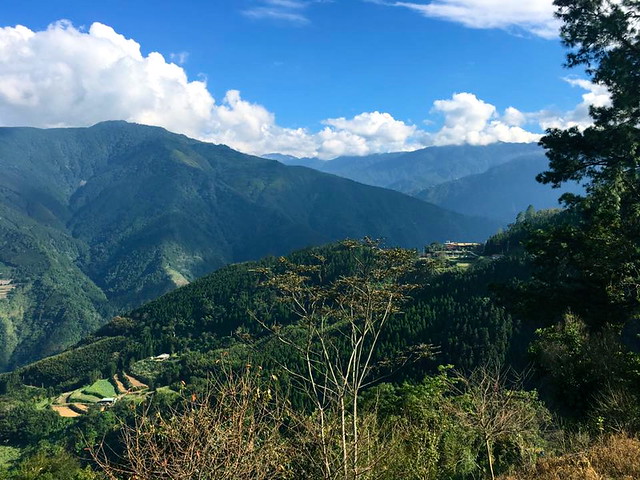
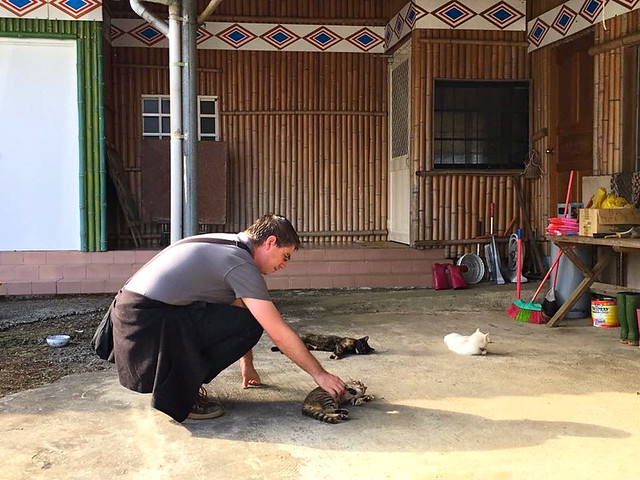
https://www.flickr.com/photos/53660106@N02/30981155555/in/dateposted-public/
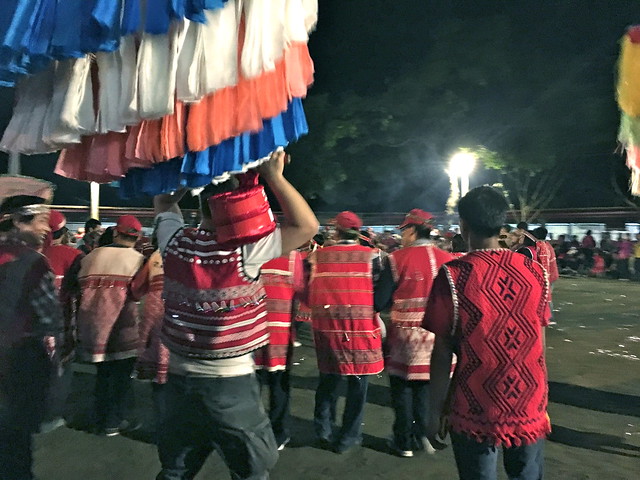
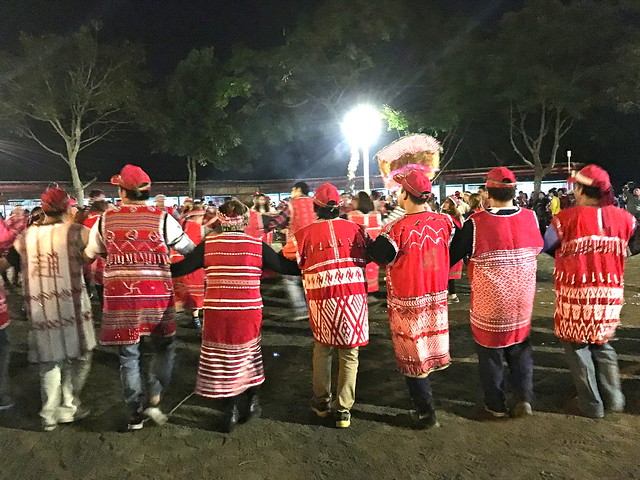
Thursday, March 3, 2011
Dance

Bunun (I think...please correct me if I'm wrong) dance in Kaohsiung's Central Park MRT Station
While we were in Kaohsiung a few weeks ago, we happened upon this aboriginal dance show taking place in the Central Park MRT Station. We'd stopped in the aboriginal goods stores opened - so we were told - partially thanks to the efforts of Chen Chu - to buy Taiwanese coffee and other small items as the show was about to start. This was not the first time we've seen aboriginal dancing - sometimes in the context of actual festivals where the dancing has some sort of cultural meaning, and sometimes...not.
If you've spent any amount of time in Taiwan at all, you've surely encountered these dance shows - you can see them every weekend evening at the Naruwan Indigenous People's Market at the intersection of Huanhe and Guangzhou Roads not far from Longshan Temple (and practically across the street from the historic Xuehai Academy, the first "university" in Taiwan - now a family shrine - also mentioned in the post linked to above). On certain days they're held in Kaohsiung's Central Park station, and there are other venues in which to see them, as well. Both Taipei City Hall and Kaohsiung Central Park MRT Stations have aboriginal stores, but only Kaohsiung's also has dances.
It's rare to have the knowledge and chance to attend many of the more authentic festivals (Pasta'ai is the easiest to get to, and even that takes some work if you want to go to Wufeng, not Nanzhuang), and you're about as likely to encounter the everyday use of traditional dress as you are to come across a Taiwanese woman walking down the street in a full qipao ("qipao-inspired" doesn't count, nor does a tiny dog in a qipao costume - a labrador in a qipao might count)...but seeing these dance shows is dead easy if you are so inclined.







Amis Tribe dance in Taipei's Naruwan Market
I'm not sure what to make of them, honestly. It is absolutely true that many (most? all?) of the aboriginal tribes of Taiwan incorporate dancing into festivals and rituals, to the point where non-aboriginal Taiwanese can often imitate the basic moves of common dances.

Dancing at Pasta'ai 2010 in Wufeng
They certainly help spread at least basic knowledge of these tribal cultures, little-known outside Taiwan. They help bring to the public eye more recognition that there is more to Taiwanese culture than that which came from China (or Japan) - more so than museums that, while important (and however excellent), are simply not as active, interactive or in the public eye.
And yet, I can't help but also watch them and feel like one adjective that could be used to describe these dances is "exploitative". Maybe. I'm not sure about that, but the thought has stayed with me long enough to spur me to blog about it. These dances, taken out of context and set down in a subway station or food court - do they really accomplish more than a fleeting thought of "yeah, aboriginal stuff is pretty cool" in the minds of the audience? Does it convey any lasting knowledge or encourage more in-depth learning about aboriginal affairs?
I guess I just don't know what to think, and yes, I realize sometimes it's OK not to have a strong opinion, and to instead muse on possible points of view.
On one hand, many people would never be exposed to this important cultural element of Taiwan if it weren't for such dance shows. That goes for locals, many (not all!) of whom wouldn't actively seek out such facets of their own national history, as well as foreigners, especially those who don't stay long enough to gain such exposure otherwise (click on the "seven hellish months" link). These dances are also generally related in some way to aboriginal stores and eateries - I love millet wine so I find myself in the stores a lot - which I am sure helps boost exposure, and therefore revenue. For what it's worth, the performers seem to enjoy themselves, and the shows do attract a reasonably sized audience, and the shows seem to be organized by the dancers themselves and not by some outside force being all "show us your quaint Native Dances!" (If that were the case I'd be disgusted).
There's also the fact that live performances, to a far greater extent than in contemporary America, are more ingrained in the public psyche. Back home you'd be hard-pressed to find a local band or singing group playing under the town square gazebo anymore, and sadly, the tradition of holiday caroling has almost died out (I'm a fan of the old-school tradition, which involves lots of wassail or a suitably alcoholic substitute, and is much more "rowdy kids demanding treats" than "family oriented").
And yet here, there's super-loud karaoke - seriously, who here hasn't started a hike up a mountain only to come across a temple and associated public complex in which someone was atonally screaming their favorite classic songs? You know you have. Don't even pretend. There are seemingly-randomly staged budaixi puppet shows (I regularly come across them in Jingmei Night Market, put on for no discernible reason).

Budaixi - Taiwanes puppetry - puppet (without body) sporting an unusual number of heads
There are free-to-the-public showings of Taiwanese opera (gezaixi) outside temples as well as in the square around Yongle Market on Dihua Street...just because the people want opera.

Taiwanese opera - gexaixi - free to the public outside Bao'an Temple
Troupes of kids practice Michael Jackson moves to Jamiroquai hits - yeah, I don't know either - or communally engage in urban dance moves - in the esplanades of sports centers and underground malls in Taipei. Finally, what is a temple fair if not a series of live performances, from lion dancers to dragon dancers to bajiajiang?

Ba jia jiang outside of Qingshan Gong during a temple fair on Guiyang St., Taipei
Practically everywhere you turn there's a live show of some sort - some of them transcendent and others amateur-but-charming.
I can see how aboriginal dance shows would fit into that sort of culture.

The second part of the show in MRT Central Park
On the other hand, taking these dances out of context, putting the dancers in costumes they otherwise never wear, that likely haven't been worn commonly since their grandparents' generation, and sticking it in a subway station does make me wonder. Is it Culture Lite? Is it selling out something that would otherwise be authentic?
I don't have the answers, but I have to admit that I've been gnawing on the questions.
Sunday, November 21, 2010
Pasta'ai 2010
 Yesterday we went up to our 2nd Pasta'ai - a festival held by the Saisiyat tribe of Taiwanese aborigines. The festival is held in two locations: "North Side" in Da'ai Village, Wufeng Township, Xinzhu County, and the other in Nanzhuang, Miaoli County.
Yesterday we went up to our 2nd Pasta'ai - a festival held by the Saisiyat tribe of Taiwanese aborigines. The festival is held in two locations: "North Side" in Da'ai Village, Wufeng Township, Xinzhu County, and the other in Nanzhuang, Miaoli County.While the event in Nanzhuang is more accessible for those without private transportation, we always make the effort to go to Wufeng as, being harder to get to and less well-known (most people assume we're going to Nanzhuang until we tell them otherwise), it's almost certainly less touristy.
My first post incorrectly stated that it was held in the "Jhu Family Village" - it's near that village, but actually in Da'ai village (大隘), about an hour or less from Zhudong, and maybe an hour and a half from HSR Xinzhu Station.
Last year, we met the owner of our homestay, Ah-Q Mama, in Zhudong and drove up with her. Her husband does all the driving. This year, her husband was laid up with recovery from surgery and they were unable to help us get to Wufeng. As we've been doing recently whenever we want to go somewhere, we've been lucky enough to have friends with Taiwanese or international licenses who are also eager to go (not that we invite them because they have licenses - we've been fortunate that they've been happy to drive). So this time, we took the wonderful HSR down and rented a car at CarPlus.
Before leaving we got directions from the tourist info desk at Taipei Main Station, and I printed out a series of maps from Google between the HSR and the site, as well as the site and the homestay.
We got a little lost in Zhudong, but not anything too serious. The drive up was pleasant, as Eduardo, our friend behind the wheel, is a conscientious driver who, being Venezuelan, is used to crazy traffic. His skills are equal to that of our friends Emily and Drew, though he's less aggressive on the road and isn't one for high speeds. The road up from Zhudong is narrow and windy, but not very high up.
There seemed to be more attempts at tourism to Wufeng this time - fabric flags lined the road up from Zhudong with "PaSta'ay" written in Papyrus font.
We arrived just after dark and parked next to a "house" that people apparently lived in, despite it not having a roof. Oookaaay...all in all parking seemed to be much more difficult to come by this year, and we had to drive quite a ways from the site before we found a suitable spot. Maybe it was just as bad two years ago, but we weren't driving ourselves so we didn't notice.
Before we could even get into the building where spirit-protecting grass is tied around your head or arm as well as all cameras, a group of dancers and torch-bearers came out of the main site, singing a chant-like melody.
 Then a line of dancers, some with back accoutrements with beads and metal chimes, came out, moving and chanting in unison.
Then a line of dancers, some with back accoutrements with beads and metal chimes, came out, moving and chanting in unison.I covered the origins of this festival in my post two years ago by linking to an online site on the Pasta'ai - you can read it here if you are interested. Basically, a long time ago there was (or may have been) a tribe of dark-skinned pygmies called the Ta'ai living near the Saisiyat. The two groups were intially friendly, but after some time, the pygmies began taking the Saisiyat women for reasons you can guess at, as well as stealing food. The Saisiyat attacked and killed the Ta'ai...but it turns out the Ta'ai knew sorcery and cursed the Saisiyat, who now have to hold the Pasta'ai as an offering at the end of the harvest season to atone for the massacre.
Anthropologists agree that the Ta'ai may well have been a real tribe in ancient Taiwan, and that the Saisiyat may well have killed them. Clearly they were not magical beings as the Saisiyat legend claims, but there is quite likely a historical basis for the story.

 I asked a local if the designs had any special meaning: she said they did not, just anything the owners found aesthetically pleasing. Buddhist swastikas (a Buddhist symbol before it was a Nazi one), curved mirrors and embroideries of surnames are common design elements.
I asked a local if the designs had any special meaning: she said they did not, just anything the owners found aesthetically pleasing. Buddhist swastikas (a Buddhist symbol before it was a Nazi one), curved mirrors and embroideries of surnames are common design elements.Making the chimes tingle in unison looks very painful for one's backside. Tired dancers with chime plates could often be found sitting gingerly with the audience while on break.
Then we entered the sacred grass-tying area.
 ...and waited in line with tourists and Saisiyat people alike. This year we saw more children than last time in traditional costume and encouraged to participate in their tribe's customs. We also saw more foreigners than two years ago - apparently a foreigner who married into the tribe sent out a large Facebook invitation and many people did end up coming. How they get to Wufeng, I have no idea.
...and waited in line with tourists and Saisiyat people alike. This year we saw more children than last time in traditional costume and encouraged to participate in their tribe's customs. We also saw more foreigners than two years ago - apparently a foreigner who married into the tribe sent out a large Facebook invitation and many people did end up coming. How they get to Wufeng, I have no idea.

 ...and watched the festival from above the main area for awhile. As you can see, the dancers go in an arc or circle, sometimes slowly, sometimes quickly. When they go quickly, they often rush to the middle and chant excitedly before fanning out again. The dancers themselves don't seem to know what they're doing - I learned from one participant that any Saisiyat in traditional clothing can join, not just experienced or trained dancers (the chanters and people with chimes on their back plates clearly know what they are doing however - and the chime beaters dance separately from the main group).
...and watched the festival from above the main area for awhile. As you can see, the dancers go in an arc or circle, sometimes slowly, sometimes quickly. When they go quickly, they often rush to the middle and chant excitedly before fanning out again. The dancers themselves don't seem to know what they're doing - I learned from one participant that any Saisiyat in traditional clothing can join, not just experienced or trained dancers (the chanters and people with chimes on their back plates clearly know what they are doing however - and the chime beaters dance separately from the main group). The facilitators in yellow vests clearly knew how it was all supposed to work and were guiding the dancers, many more of whom were young Saisiyat children this year.
 Before heading to the main area, we went to the row of food stalls nearby to get dinner. We started with a traditional Saisiyat dish...
Before heading to the main area, we went to the row of food stalls nearby to get dinner. We started with a traditional Saisiyat dish......of grilled muaji (rice gluten) covered in chocolate and rainbow sprinkles. (I was being sarcastic about the "traditional" bit).
Then we got our main dinner of mountain pig, cabbage and "rice wine chicken soup", which was so potent with rice wine that I'm pretty sure it had more alcohol in it than broth. As Joseph said, "it's like eating a bottle of vodka". I liked it, but none of us could finish it.
 This year the rules about taking photos of the front of the dancers (thereby standing in front of them in what I had thought was a "sacred area") were relaxed.
This year the rules about taking photos of the front of the dancers (thereby standing in front of them in what I had thought was a "sacred area") were relaxed. I also noticed an investment in Christmas lights to decorate around the area (look above the heads of the dancers).
I also noticed an investment in Christmas lights to decorate around the area (look above the heads of the dancers).  The dancing and chanting is to call forth the spirits of the Ta'ai, and appease them. The big tinsel and light-up things are made by different families - each family makes one. One woman told me that usually, the children will help decorate it, so as to teach them about their culture and heritage. I couldn't determine any pattern for the holders of these giant talismans, though they did dance and did seem to somewhat follow the arc of dancers. When the dancers would rush to the middle and excitedly chant, these were always in the very middle.
The dancing and chanting is to call forth the spirits of the Ta'ai, and appease them. The big tinsel and light-up things are made by different families - each family makes one. One woman told me that usually, the children will help decorate it, so as to teach them about their culture and heritage. I couldn't determine any pattern for the holders of these giant talismans, though they did dance and did seem to somewhat follow the arc of dancers. When the dancers would rush to the middle and excitedly chant, these were always in the very middle. I was told that the semi-conical shape was...well, I couldn't really understand the woman clearly but either to bring the Ta'ai spirits down like water through a funnel, or to broadcast the families' participation to the Ta'ai, like a reverse satellite dish or suntanning mirror. It had something to do with calling souls. Note the sacred grass affixed to the top of each.
I was told that the semi-conical shape was...well, I couldn't really understand the woman clearly but either to bring the Ta'ai spirits down like water through a funnel, or to broadcast the families' participation to the Ta'ai, like a reverse satellite dish or suntanning mirror. It had something to do with calling souls. Note the sacred grass affixed to the top of each. This was the friendly woman who answered my various questions about the event details to the best of her ability and to the best of my limited understanding.
This was the friendly woman who answered my various questions about the event details to the best of her ability and to the best of my limited understanding. By about 9pm, people were starting to get seriously wasted on traditional millet wine. As it was with the last Pasta'ai, you don't just buy and drink your own millet brew. You buy some, share it with others, and get glasses of others in return. We tried to minimize this, or at least sniff what we were about to drink this year, but it can't be helped to some extent. The two non-drinkers among us managed to actually not drink, though - which surprised me. It was impossible to avoid two years ago by the time 10pm rolled around. Forget teetotalling. By 9:30 we had plenty of new 酒肉朋友 (drinking buddies).
By about 9pm, people were starting to get seriously wasted on traditional millet wine. As it was with the last Pasta'ai, you don't just buy and drink your own millet brew. You buy some, share it with others, and get glasses of others in return. We tried to minimize this, or at least sniff what we were about to drink this year, but it can't be helped to some extent. The two non-drinkers among us managed to actually not drink, though - which surprised me. It was impossible to avoid two years ago by the time 10pm rolled around. Forget teetotalling. By 9:30 we had plenty of new 酒肉朋友 (drinking buddies).
Who's this guy? No idea. He invited us to cone stay with him in Zhudong, though, and treated us to much of his millet wine - which had an aftertaste redolent of gasoline.
 Some random people dressed up Brendan and Eduardo in traditional clothing - I had a touch of grease from *something* on my lens but still wanted to post these.
Some random people dressed up Brendan and Eduardo in traditional clothing - I had a touch of grease from *something* on my lens but still wanted to post these.This year, the participation rules were also relaxed, probably in another attempt to promote tourism. Last year you could not participate until midnight. This year, you could join the dancers at 10pm.
With an election looming, even though Xinzhu isn't an election hotspot this time around, we expected a bigger showing of politicians. A few members of the DPP showed up, looking...well, like quintessential members of the DPP.
 Plenty of traditional aboriginal food was on offer - including these roasted birds (tiny quail? Pigeons? We had pigeon in Egypt and this tasted different.) They cut it up for you so it's easy to eat, but I'd forgotten that they give you the head with everything else. Before I knew what it was, I'd bitten into the brain. EWWWWW. I am pretty openminded about food, but I do not do innards or brain. I chucked it at a pile of accumulating garbage, missed and hit some poor woman's coat.
Plenty of traditional aboriginal food was on offer - including these roasted birds (tiny quail? Pigeons? We had pigeon in Egypt and this tasted different.) They cut it up for you so it's easy to eat, but I'd forgotten that they give you the head with everything else. Before I knew what it was, I'd bitten into the brain. EWWWWW. I am pretty openminded about food, but I do not do innards or brain. I chucked it at a pile of accumulating garbage, missed and hit some poor woman's coat. Oops.
What happens at Pasta'ai stays at Pasta'ai is all I can say.
We also got some amazing sweet potato fries and one drunk guy gave us stinky tofu (YUM!) and onion pancakes.
 More dancing above, and a detail shot of the conical family talisman things below. The carrier had been hitting the betel nut pretty hard. Along with millet wine, buckets of energy drink in brown bottles and betel nuts were for sale everywhere.
More dancing above, and a detail shot of the conical family talisman things below. The carrier had been hitting the betel nut pretty hard. Along with millet wine, buckets of energy drink in brown bottles and betel nuts were for sale everywhere. So, at 10pm we all started dancing - not that we knew how. Last time, women would come around with wooden buckets of millet wine and ladle it into your mouth as you danced. This year that was not so common, and they had plastic pitchers of wine with shot glasses for dancers - but there was less going around. Boo.
So, at 10pm we all started dancing - not that we knew how. Last time, women would come around with wooden buckets of millet wine and ladle it into your mouth as you danced. This year that was not so common, and they had plastic pitchers of wine with shot glasses for dancers - but there was less going around. Boo.
On the upside, I didn't get heinously drunk this year (yes, I know my family reads this thing, but I gotta be honest. I got really drunk last year. It's an aboriginal festival - you can't not get drunk the first time or, for that matter, any time). Fortunately the homestay owners were not drinking and could make sure we all got back safely. It was the worst hangover I've ever had - you don't want to know the full story about the next morning. Let's just say that when the worst of it hit, only my sister was awake to hear it, and she'll never think of me the same way again.
But that was last year - when I would drink whatever was offered without making sure it wasn't, you know, grain alcohol, paint thinner, energy drink and Coca-cola mixed together...or maybe not that but not tasting much different from what I imagine that would taste like.
This year I kept my head on a little better - partly because I didn't want to feel half-dead today (I'm writing this the next day even!) and partly because we didn't have Ah-Q Mama to get us home safely. I had to help Eduardo navigate, though Mark (another friend who came with us) had biked the route and took over for me.
At one point while I was dancing, though, someone gave millet wine to Mark, Joseph and Brendan, who all surreptitiously threw most of it out as it was "not fit for human consumption" according to Brendan.
I felt bad for the woman walking around selling it from a basket on her back. She was selling it for cheaper than the stands, and clearly making money for her family, but we had some from another spectator who bought it, and it really did have a gasoline-y aftertaste. Ew.
Anyway.


We stayed and danced until about 3am before walking back to the car, after which time the eminently sober Eduardo drove us to Ah-Q Mama's with Mark's help (as Mark had biked there earlier and knew the way).
I recommend Ah-Q's homestay, "A-mue", as highly as I did last year. With a delicious homemade breakfast, great view, friendly owners, warm blankets, adorable pets and rustic setting not far from Guanwu (entrance to a national park), the residence of Zhang Xueliang, Dabajianshan and the Pasta'ai, it's a great spot for a rest if you have your own transport.
We got there at 4am - they'd left the rooms open for us - and collapsed into bed.
I awoke at 7am with a headache, took some Panadol and slept again until about 10 or 11. The coterie of dogs from two years ago was nowhere to be seen, but in their place, they had a pile of kittens.
 O.M.G. 好可愛喔!! How cute is this pile of adorableness?
O.M.G. 好可愛喔!! How cute is this pile of adorableness? They pretended to like Brendan because they were hoping he'd open the door to the kitchen area for them. We visited for a bit, drank tea, ate breakfast, enjoyed the view, played with the kittens and puppy, and they reminded me of how ridiculously hungover I had been last time. (Also, apparently they understand my Chinese now.)
They pretended to like Brendan because they were hoping he'd open the door to the kitchen area for them. We visited for a bit, drank tea, ate breakfast, enjoyed the view, played with the kittens and puppy, and they reminded me of how ridiculously hungover I had been last time. (Also, apparently they understand my Chinese now.)Because we don't know if or when we'll be back in that area or when we'll have our own transportation, we had a look a few kilometers down the road to the former residence of Zhang Xueliang who you can read about on Wikipedia. Pretty nice place to live out your days under house arrest...
 ...and anyone who managed to kidnap Chiang Kai-shek is someone I can't dislike too much, even if the Mainlanders think he's a hero.
...and anyone who managed to kidnap Chiang Kai-shek is someone I can't dislike too much, even if the Mainlanders think he's a hero. The entire experience left me with four lasting thoughts:
1.) That picture of the nice older lady I posted above? She speaks fluent Saisiyat and Chinese, but surrounding her were her children and grandchildren (of which she had many). Not one of her grandchildren could speak the Saisiyat language, despite being in touch with their culture enough to participate in the Pasta'ai. The Saisiyat are not even the tiniest or most assimilated of the aboriginal tribes - if their own language is dying out to the extent that grandchildren cannot speak their grandparents' mother tongues, then this does not bode well for the future of aboriginal languages in general (which are commonly recognized to be dying out at an alarming rate).
On the other hand, it's fascinating to head up through these villages and realize that you aren't hearing even one word of Chinese or a Chinese-related language spoken. There are still more native speakers of Atayal, Saisiyat etc. who use it on a daily basis than one would expect.
2.) Every once in awhile I get a thought in my head that goes something like this: "What are you doing spending so much time and money traveling instead of saving, buying a home and working on a career? Haven't you noticed that people are people no matter where you go, that travel is a luxury that, when you're done with it, leaves you with no material gain? Anyway, haven't you traveled enough?" Experiences like the Pasta'ai remind me that no, people are not the same everywhere you go, and that while there may be no material gain to travel, there's a lot of gain in terms of cultural exposure, wisdom and knowledge of the world. I'm not one of those people who travels without trying to learn (and retain) something about the history, politics, economy, language and culture of a place or event - so I inevitably come away with new pieces of firsthand knowledge.
Sure, I could read about Taiwan in a book - it's pretty clear that many policymakers in the US State Department do just that. (Officers travel abroad, learn languages and have a wide scope of global knowledge, but I've noticed that actual policymakers and those who influence decision-making...well...don't - even representatives posted to the countries they're dealing with). If I had "stayed home", built a career and had a more settled life in the country of my birth, sure, I could read, watch TV shows, see movies and learn online about different people in different parts of the world, but I wouldn't really know anything tangible about them, and I would completely miss out on things like Pasta'ai. How many newspaper articles, websites, TV shows and school textbooks on Taiwan mention aborigines, let alone the Saisiyat, not to mention their festivals or really any pertinent information about them? Most people don't even know that Taiwan has aborigines to begin with.
And that right there is valuable, and it's one of the main reasons, if not the #1 reason, why I continue to travel even as pressure increases to settle down.
3.) Ten minutes at a festival like this will show any nay-sayers, fence-sitters and ignoramuses who get their opinions from scant news articles rather than real world experience to what very great extent Taiwan is not a part of China. How could anyone claim that a country with a rich mixture of heritages, which includes but is not summed up by Chinese culture? This is not only not Chinese, this is something you will never see in China, something that has never had anything to do with China. Something created and continued by people who are not ethnically Chinese and hail from an entirely different cultural tradition than anything East Asia could offer, let alone China. It's unique to Taiwan, and showcases how Taiwan is unique. And, if you'll allow me to expand on that, showcases how much a unique place like Taiwan deserves to be recognized as the self-governing nation and cultural unit that it is.
Though I would not judge anyone who says that Taiwanese culture is strongly influenced by Chinese culture, and much of it originated there, I stop short at accepting that the entirety of Taiwanese culture was imported from China. As you can clearly see here, it was not - at least not entirely. This goes beyond the case for the divergent cultural evolutions (and Revolutions, har har har) of China and Taiwan - this is at the core of things, a fundamentally Taiwanese cultural facet that evolved long before there even was a "Taiwan" and a "China".
4.) There is really something to be said for having your own vehicle and the skills to drive it. I wish I had those skills (or rather, I have them but I wish I had the experience and confidence to use them in Taiwan). The freedom of being able to visit these places and participate in these festivals - and one thing that sets Pasta'ai apart from the Taiwanese temple fairs is that the audience can participate - with your own transportation is a great feeling, and I wish we had more access to it. Which means more practice for me.
Labels:
aboriginal_culture,
aboriginal_food,
aborigine,
car_rental,
drinking,
driving,
pastaai,
saisiyat,
wufeng,
xinzhu,
zhudong
Subscribe to:
Posts (Atom)










